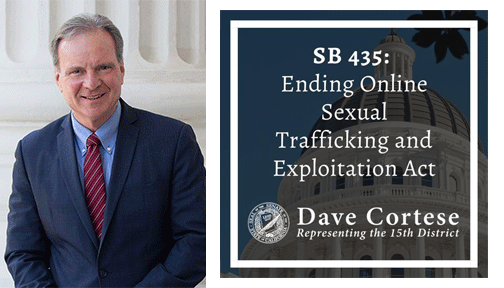Senator Dave Cortese (D-Silicon Valley) made the following statement regarding his bill SB 435, The Ending Online Sexual Trafficking and Exploitation Act, passing through the Senate Judiciary Committee on January 12th.
SB 435 which is meant to “put an end to human trafficking in the digital age” is sponsored by the California Women’s Law Center and supported by a broad coalition of advocates for ending sexual assault and exploitation including the Audrie Pott Foundation, the Coalition Against Trafficking in Women, Democratic Activists for Women, the Enough Is Enough Voter Project, Equality Now, Feminist Majority, the Santa Clara County Democratic Party, the Silicon Valley Democratic Club, and Women’s March San Jose.
“The coalition behind SB 435 is committed to empowering victims of ‘digital trafficking’ and ending online sexual exploitation as swiftly as possible. I’m appreciative of my colleagues for listening to survivors of this type of online abuse and for advancing this important measure.”
“I want to be very clear – this bill only seeks to eliminate the circulation of online content of a sexual nature that is shared, distributed, or uploaded against a person’s will as well as the sharing of child sexual abuse material online. Victims of this form of exploitation deserve some form of recourse and our civil code, as it stands, simply doesn’t afford them that. SB 435 is a first-in-the-nation bill to end the trafficking of nonconsensual digital sexual material that has become increasingly pervasive nationwide.”
Notes:
- The committee vote was 6-1 with Senator Scott Wiener voting “no”.
- The bill was introduced in February of 2021
- The National Human Trafficking Resource Center (NHTRC) has determined that the largest majority of human trafficking cases reported nationally each year are in the state of California.
SB 435 would allow a victim of online sexual trafficking to bring a civil action for damages, including compensatory damages and punitive damages, against any person or entity that makes, obtains, uploads, reuploads or distributes in any form, including electronic distribution, non-consensual, sexually explicit content.
Actionable material includes content where a victim was under 18, content where a person of any age is coerced, tricked, or forced into performing a sexual act, and content that is sexual in nature and that is circulated in any way without a person’s knowledge or permission. This can include a photo or video that was originally taken in private with a person’s consent but was then shared and distributed across the internet without their consent.
Along with damages awarded to a victim, an offender must pay $100,000 for every 2 hours of online exposure of illegal content after given notice to take said content down. This amount is doubled to $200,000 for every 2 hours if the victim of online sexual exploitation is under 18 years of age.
Any online service that breaks this law would have to disclose this violation publicly on their website.
The bill also targets repeat offenders, levying higher fines on those entities and online services that continue to circulate illegal content.
Former Assemblywoman and Executive Director of the California Women’s Law Center, Betsy Butler, calls this the first piece of legislation of its kind to give online sexual assault victims sufficient legal avenues to fight back against their perpetrators. The California Women’s Law Center is a sponsor of SB 435.
“This law, rooted in the California Women’s Law Center’s mission of seeking justice, will help prevent abuse and assist survivors of human trafficking rebuild their lives,” Butler says.
This bill is also being supported by the Coalition Against Trafficking in Women, Next Door Solutions to Domestic Violence, Community Solutions, and the Enough is Enough Voter Project.
Senator Cortese’s track record on combatting human trafficking includes the creation of the Anti-Human Trafficking Team as well as a $5 million annual reserve to prevent and treat victims of domestic violence, sexual assault, and human trafficking in Santa Clara County. In partnership with Professor Dauber, he recently spearheaded a first-of-its-kind audit of Title IX policies and procedures for Santa Clara County K-12 schools and colleges to address how schools handle allegations of sexual assault and harassment.

